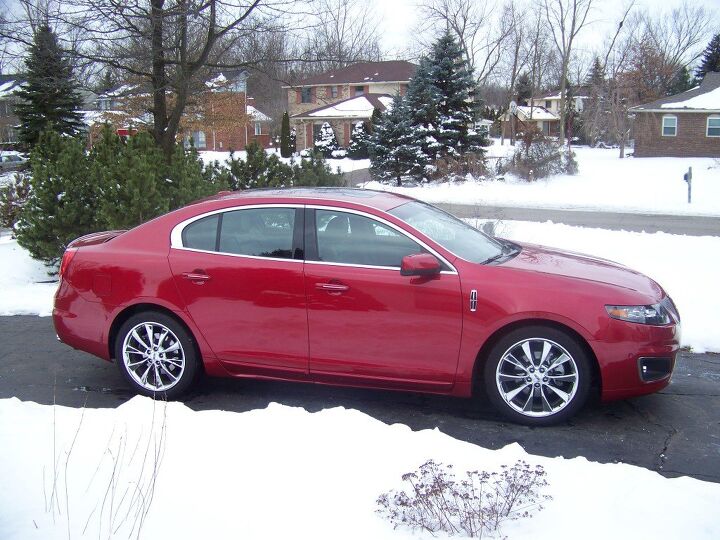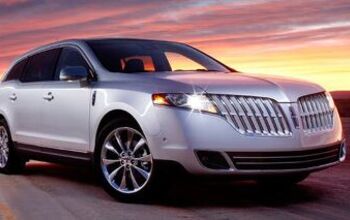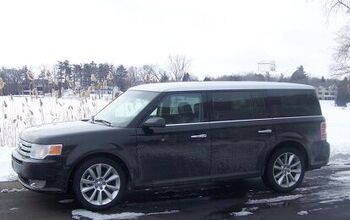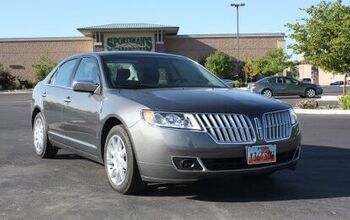Review: Lincoln MKS Ecoboost Take Two
If Lincoln were a person, it would have been committed to a psych ward years ago. Battered by corporate politics, economic cycles, and a desire to both retain traditional customers and conquest new ones, the brand has lacked a coherent identity for over a quarter-century. There have been times when each of its models was the product of a different strategy and expressed (or failed to express) a different design language. In the early 2000s Lincoln seemed to finally be getting its shit together, with a brilliant Continental Concept and a common design language applied to all of its 2003 models. Then the wheels came off the wagon—again—and a bankruptcy-skirting Ford had no choice but to cancel the ambitious cars in the PAG pipeline and redo Lincoln on the cheap. Did they spend their pennies well? What is a Lincoln in 2010? There’s no better place to find out than the driver’s seat of the current flagship, the MKS EcoBoost.
There’s absolutely no sign of the long, sleek Continental Concept in the MKS. To save money, Lincoln based its latest large sedan on the Five Hundred. To their credit, the designers made the most of the platform’s challenging proportions, scrunching the greenhouse, blacking out the rockers, and detailing the exterior much as Lexus would have. Aside from its chunky proportions, the car isn’t distinctive, but it has presence.
The tested MKS EcoBoost had the $2,995 Appearance Package, which takes the car in the wrong direction. The rockers are not only body color, but they’re extended with side skirts. The last thing this body needs is to appear taller. The package’s 20-inch chromed alloys accentuate the insufficiency of the wheelbase. And the extra-cost Red Candy Metallic paint? Not the right shade for this car.
Inside, vestiges of Lincoln’s earlier aesthetic remain in bits of satin metal trim. But the overall appearance is much less distinctive and, while a couple steps up from the related Taurus, not quite luxury class. High points: the upholstered IP upper, glitzy instruments, and soft brown leather seats. Low point: the black plastic trim panel on the rear face of the center console doesn’t have the metallic sheen of the other trim panels and wouldn’t even look suitable in a Focus.
None of this mattered one bit to my wife. She fell in love with the MKS because it does other aspects of luxury very well. The interior is hushed even at highway speeds. The large seats are heated, cooled, and cushy—no BMW emulation here. There’s less room than in the Five Hundred—function has been traded for form—but still plenty of it. And the car is chock full of gadgetry: automatic auto-dimming steering-linked headlights, automatic wipers, adaptive cruise, active parking, keyless access and ignition, THX audio, voice-activated nav, SYNC, and a rearview monitor that, combined with front and rear obstacle detection, makes the car’s severely restricted rearward visibility a non-issue.
Ford couldn’t afford to develop a new V8. So, through some odd twist of economics, it developed a twin-turbo DOHC V6 instead. The EcoBoost V6 doesn’t make lusty sounds, but at least it sounds more refined in the MKS than in the Flex. There’s no boost lag to speak of and all 355 horses are present and accounted for when you mash the go pedal. Despite the requisite all-wheel-drive, drive this car harder than it’ll typically be driven and there’s an occasional twinge of torque steer. The Eco bit isn’t just marketing hype. I observed 19 MPG in suburban driving, and 24 on the highway, surprisingly good for 355-horsepower, 4,400-pound car.
Know how some cars shrink around you the harder you push them? The MKS is not one of those cars. Mind you, it doesn’t fall all over itself in hard turns. It just prefers a more sedate driving style, and long stretches of highway most of all. You sit crossover high, and never does the MKS feel an inch smaller or a pound lighter than it is. Which is larger and heavier than it looks—the tall bodysides and large wheels trick the eye. How big is it? Compared to an Audi A6, the MKS is 10.6 inches longer, 2.9 inches wider, and 4.1 inches taller. It’s a “whole lotta car.” The Fusion-based Lincoln MKZ I drove the following week felt as sharp and tossable as a Miata in comparison. In Lincoln’s defense, it didn’t aim to create a sport sedan with the MKS, turbos and paddle shifters notwithstanding. Even with EcoBoost the suspension is biased in favor of ride quality (which is nevertheless merely good, not great). The Appearance Package’s side skirts and spoiler would be all wrong even if they looked right.
Not the most refined, but loads of features—sounds like a value play. Is it? Close comparisons aren’t easy to come by—there aren’t many truly large 350-plus-horsepower all-wheel-drive sedans on the market for anything close to the MKS’s price. Similarly load up an Audi A6 4.2 quattro, and the smaller, German luxury sedan lists for about $10,000 more. An Infiniti M45 AWD? About $11,000 more. While the Lincoln’s $54,000 price tag (sans Appearance Package) seems steep, others are significantly steeper. With one notable exception: the Hyundai Genesis 4.6 undercuts the MKS EcoBoost by about $10,000. Adjust for the Lincoln’s additional features, including all-wheel-drive, using TrueDelta’s car price comparison tool and the Korean sedan retains a $7,000 advantage.
And so, what is Lincoln? Judging from the MKS EcoBoost, it’s size, power, silence, soft leather, and lots of buttons. These are all things Lincoln used to be known for, and all are turn-ons for the typical American luxury sedan buyer with no desire to carve a curve quickly. The MKS is a little rough around the edges, but many of these buyers won’t care or even notice. The relatively low price will help. But will potential buyers notice the MKS in the first place? The main thing missing: styling that is just as unapologetically American as the rest of the car. Something like that aborted Continental.
Michael Karesh owns and operates TrueDelta, an online source of auto pricing and reliability data
Lincoln provided the car, insurance, and one tank of gas for this review
Michael Karesh lives in West Bloomfield, Michigan, with his wife and three children. In 2003 he received a Ph.D. from the University of Chicago. While in Chicago he worked at the National Opinion Research Center, a leader in the field of survey research. For his doctoral thesis, he spent a year-and-a-half inside an automaker studying how and how well it understood consumers when developing new products. While pursuing the degree he taught consumer behavior and product development at Oakland University. Since 1999, he has contributed auto reviews to Epinions, where he is currently one of two people in charge of the autos section. Since earning the degree he has continued to care for his children (school, gymnastics, tae-kwan-do...) and write reviews for Epinions and, more recently, The Truth About Cars while developing TrueDelta, a vehicle reliability and price comparison site.
More by Michael Karesh
Latest Car Reviews
Read moreLatest Product Reviews
Read moreRecent Comments
- Dartdude The global climate scam is a money and power grab. If you follow the money it will lead you to Demo contributors or global elitists. The government needs to go back to their original purpose and get out of the public sector.
- FreedMike Miami is a trip - it's probably the closest thing we have to Dubai in this country. If you are into Lambos and the like, definitely go - you'll see a show every night. These condos fit right in with the luxury-brand culture - I'm surprised there isn't a Louis Vuitton or Gucci building. I was in Miami Beach in January with my fiancee, and we shared a lovely lunch that consisted of three street tacos each, chips and salsa, and two sodas. Tab: $70.00, with tip. Great town, assuming you can afford to live there.
- Kjhkjlhkjhkljh kljhjkhjklhkjh Pay money to be inundated in Adverts for a car that breaks when you sneeze? no
- Laflamcs My wife got a new 500 Turbo in 2015. Black exterior with an incredible red leather interior and a stick! The glass sunroof was epic and it was just about the whole roof that seemed to roll back. Anyway, that little bugger was an absolute blast to drive. Loved being run hard and shifted fast. Despite its small exterior dimensions, one could pile a lot into it. She remember stocking up at COSTCO one time when a passerby in the parking lot looked at her full cart and asked "Will it all fit?" It did. We had wonderful times with that car and many travels. It was reliable in the years we owned it and had TONS of character lacking in most "sporty" car. Loved the Italian handling, steering, and shift action. We had to trade it in after our daughter came along in 2018 (too small for 3 vacationers). She traded it in for a Jeep Renegade Latitude 6 speed, in which we can still feel a bit of that Italian heritage in the aforementioned driving qualities. IIRC, the engine in this Abarth is the same as in our Renegade. We still talk about that little 500..........
- Rochester If I could actually afford an Aston Martin, I would absolutely consider living in an Aston themed condo.








































Comments
Join the conversation
There's a reason that the MKS and the Taurus, actually every new offering from Ford, are so expensive. Ford needs to make a profit, plain and simple. Ford is pricing the line-up to reflect that salient fact. Does anybody really believe that GM is selling their upscale cars for a large profit? Or does a bankruptcy and government largesse maybe allow for some creative pricing? The knock on the D3 was that between huge amounts of cash on the hood, 0% finance rates and channel stuffing was that they were incapable of making profits. Now that Ford has taken steps towards profitability, I see many comments that their prices are too expensive. You can't have it both ways. The MKS competes against the Infiniti M series, the Audi A6, Cadillac CTS and the Lexus GS. Surprise, surprise, it's priced about the same! It may come up short in some areas of comparison, but almost every review I read, including the above review, it's a worthy competitor. And maybe there will be incremental improvements with each model year until it becomes a benchmark. Ford only has so much cash to spread around and is unable to spend untold billions to immediately improve every single model every year in each segment. At this point Ford is making baby steps with each new model and refresh. It will take years to remake the entire lineup; Ford is on the right track with each new model, and the Euro based Fiesta and after that the Focus will set the bar very high for competitors.
I have owned various cars including Corvettes, an A8 Audi and a Porshe 928S. I find the Lincoln MKS with the ecoboost to be an excellent car. In fact, I like it more than any car that i've had since the Audi A8 without having to shell out almost $100,000. For $100,000 plus I would hope that the S550 would outshine the MKS. Not to mention that the $100,000 Mercedes depreciates within 2-3 years in an amount equal to the full price of the MKS. And if you think the sync system is gimmicky, I'm sure you don't mess with new fangled gadgets like Iphones or Droid phones.